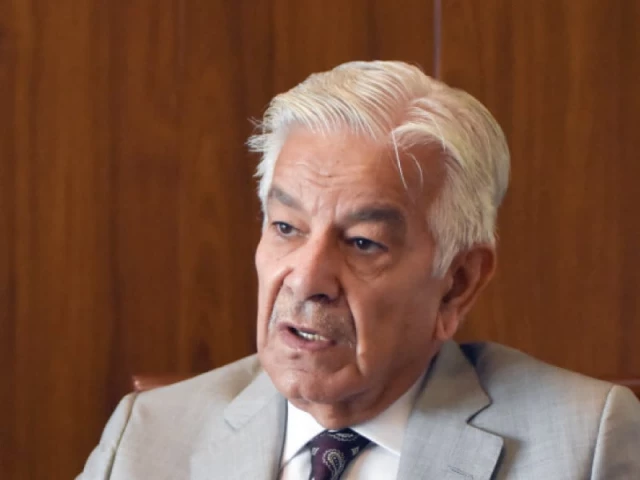Asif accuses the Taliban of dragging Afghanistan into a new conflict to protect dominance, the war economy
Defense Minister Khawaja Asif has warned that if necessary, Pakistan could defeat the Taliban regime and set an example for the world.
Commenting on the failed talks in Istanbul, Khawaja Asif said that the Afghan Taliban regime had repeatedly sought talks with Pakistan through “brotherly countries” and Pakistan had accepted the offer in the interest of peace. He added that some “toxic” statements by Afghan officials hinted at growing discord and duplicity within the Taliban leadership. Express news reported.
He said Pakistan did not need to use its full force to dismantle the Taliban or drive them into hiding. “If necessary, we can defeat them in places like Tora Bora and be an example to people everywhere,” he said, calling it “a spectacle that the international community would watch with interest”.
He accused the Taliban of dragging Afghanistan into another conflict to preserve their rule and wartime economy.
Pakistan and Afghanistan agreed to an immediate ceasefire during talks in Doha, both sides said on October 19, after a week of fierce border clashes, the worst violence between the South Asian neighbors since the Taliban seized power in Kabul in 2021.
Read: Peace negotiations between Pakistan and Afghanistan have stalled
The two countries met again in Istanbul on October 25 to exhaust “detailed matters”. But the talks between Pakistan and Afghanistan in Istanbul have not yielded any breakthrough on Islamabad’s central demand for a clear action plan to dismantle terrorist infrastructure operating from Afghan soil.
Federal Information Minister Ataullah Tarar confirmed on his social media platform X account on Tuesday that the dialogue between Pakistan and Afghanistan in Istanbul had failed.
“Thus, the dialogue failed to produce any workable solution. We thank the governments of Qatar and Turkiye, and other friendly states, for their support and sincere efforts to create a peaceful solution to the problem of terrorism,” the minister wrote.
Read more: The Istanbul talks collapse as the Taliban refuse to act against terrorist groups
Mr. Asif said Taliban officials, aware of their weaknesses and the reality behind their bellicose claims, are “beating the drum of war” in a failed attempt to save their reputation among Afghans. “If the Afghan Taliban remains intent on destroying Afghanistan and its innocent people, so be it – whatever happens, will happen,” he said. He also dismissed the idea that Pakistan was an “empire”, saying Islamabad did not see itself in those terms.
The defense minister said that because of the Taliban, Afghanistan had become little more than a graveyard for its own people. While historically called the “graveyard of empires,” he said the country had long served as a stage for great power rivalry. He warned militants seeking to take advantage of regional instability that they had misjudged Pakistan’s resolve.
“If the Taliban regime tries to fight, the world will see that their threats were mere bluffs,” Mr Asif said. “Pakistan will not tolerate any terrorist or suicide attack on its soil and any adventurism will be met with a firm and bitter response.”
He urged the Taliban to be mindful of their fate and warned that testing Pakistan’s resolve and capacity would prove very costly.
Read also: Explained: Pakistan-Afghanistan border conflict
According to sources familiar with the discussions during the talks in Istanbul, the Afghan delegation repeatedly exhibited obstructionist behavior and avoided direct answers. Some members reportedly used provocative, dismissive and even abusive language during the meetings, leaving Turkish and Qatari mediators surprised by their attitude.
Tensions escalated after unprovoked firing by the Afghan Taliban regime
Tensions along the Pak-Afghan border escalated on October 11 when clashes erupted after Afghanistan opened unprovoked fire at several locations in Khyber Pakhtunkhwa (KP) and Balochistan, prompting a swift and forceful response by the Pakistan Army. Several Afghan positions were destroyed and dozens of Afghan soldiers and militants were killed.
“The Pakistan Army responded immediately and decisively,” security sources said. “The counteroffensive effectively targeted and destroyed several Afghan positions on the border. Dozens of Afghan soldiers and Khwarij were killed in retaliatory fire”.
A 48-hour ceasefire was agreed at the behest of the Afghan Taliban regime following Pakistan’s “precision strikes” on Taliban and terrorist hideouts in Kandahar and Kabul.
According to the State Department, the decision was made at the request of the Taliban and with the mutual consent of both sides. Both parties must engage in constructive dialogue and make sincere efforts to find a “positive solution to a complex but solvable problem,” the ministry said.



